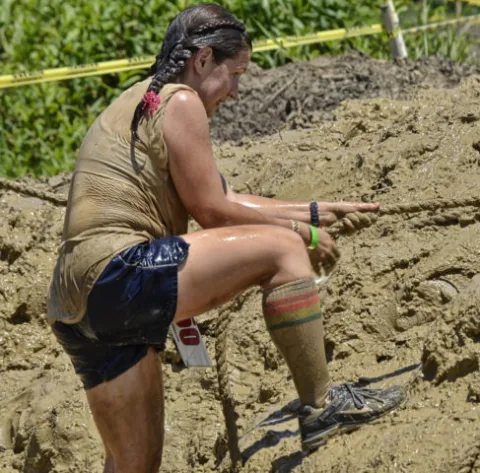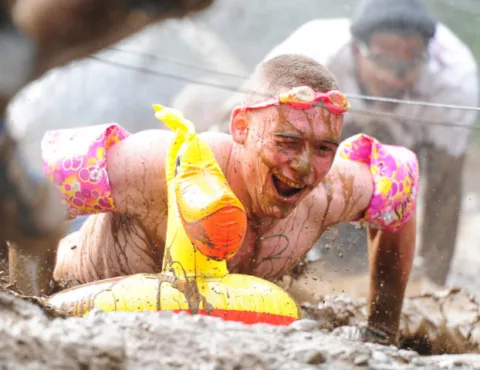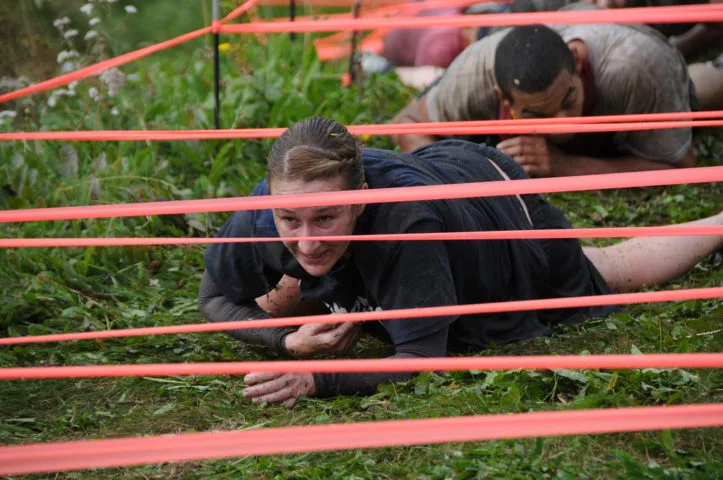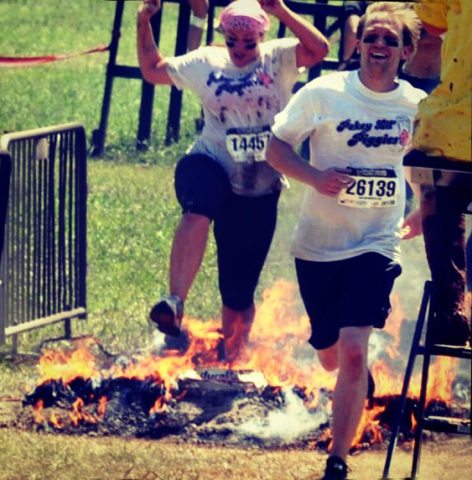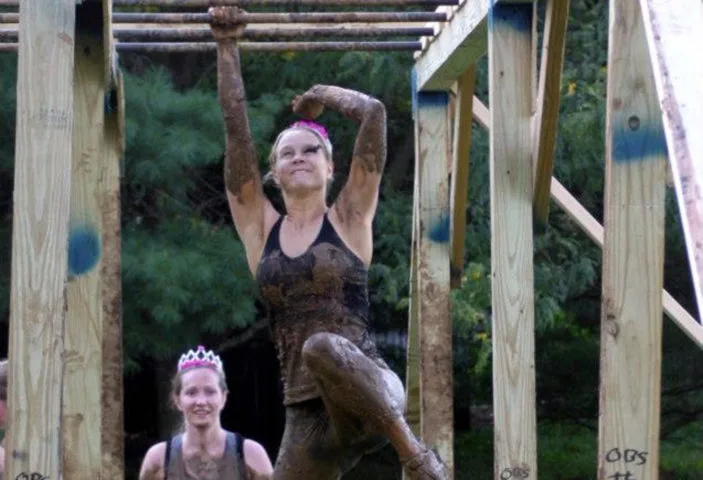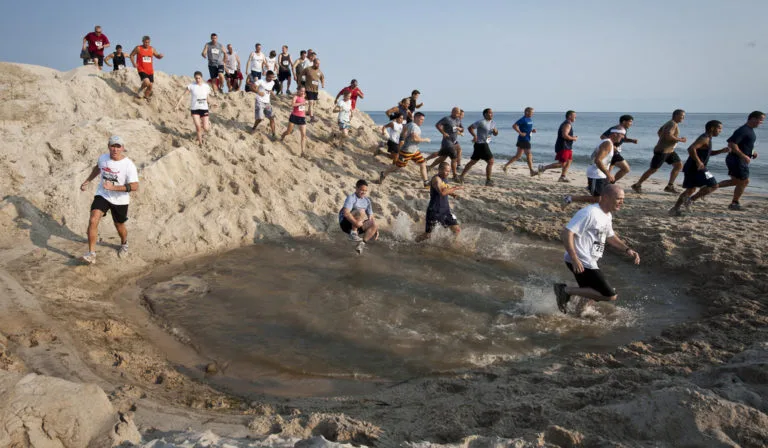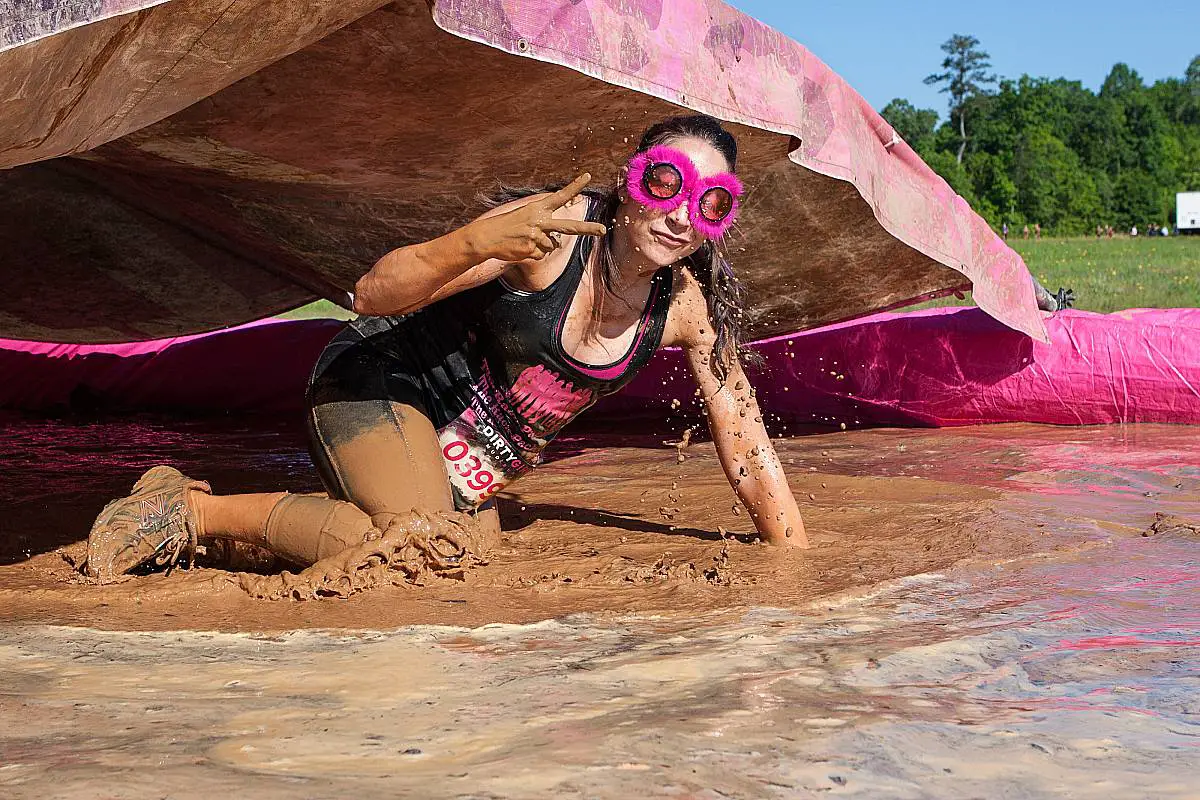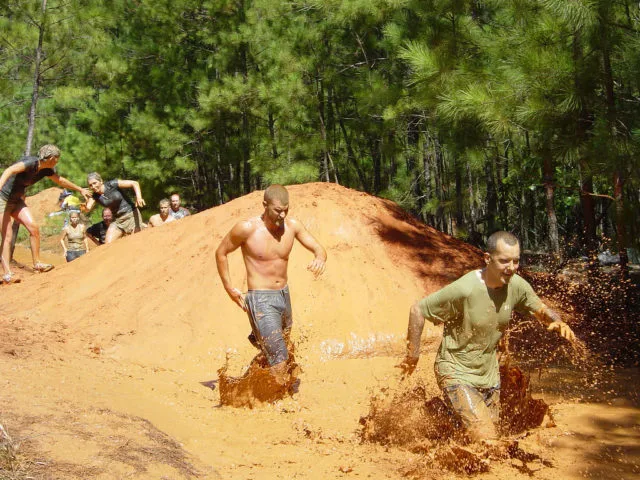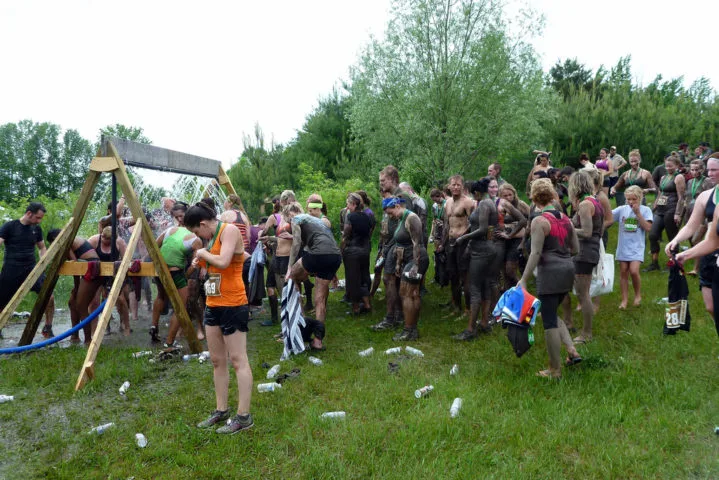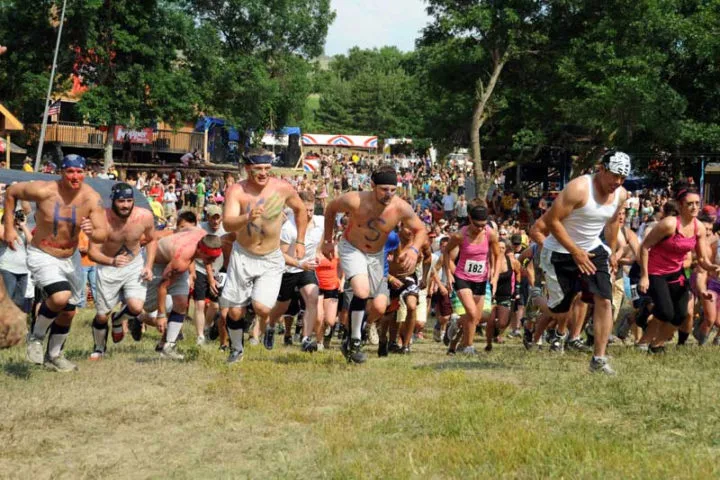You’ve probably seen or heard about some kind of mud run lately.
…Everyone’s doin’ it!
But you may be wondering what a mud run is really like.
I know at least one of my friends refused to participate in a mud run with me simply because she didn’t know what to expect.
Well, here’s the dirt about mud runs — from someone who’s done a few of them now.
Following are some helpful tips that I put together after participating in my first mud run…
What Is A Mud Run?
A very basic mud run is just that — a regular race like a 5K with some mud puddles to slog through.
Regardless of the mileage (2 to 20 miles, or more), most mud runs involve some type of obstacle elements in addition to the mud.
These obstacles (described below) are designed to challenge you both physically and mentally. They will take you out of your comfort zone and have you trying things that you might not normally do.
The obstacles are spread out over the course. For example, a 5K mud run might have 11 obstacles spaced throughout. 5K seems to be the most common distance for the mud run events, but some will be shorter and some longer.
(By the way, I’ve read that some of the shorter events have the hardest obstacles!)
From here on, I’ll use the term “mud run” to refer to any mud run / walk event with obstacles.
Why Are Mud Runs So Popular?
Debuting in 1987, the Tough Guy claims to be the first official obstacle course race in the world.
So, why are mud runs suddenly so popular? And why are so many people doing them?
Here are some of the reasons that people say they like mud runs:
- For the personal challenge — to see what you can do when you put your mind to it
- For the exercise and level of fitness that results — it’s a way to stay active
- For the camaraderie — having something fun to do with friends
- For the charities — being able to make a difference
- For the sense of accomplishment — setting and meeting goals (pre-race, during the race, and post-race)
- For the fun activities without all of the competition normally found in “races”
Obstacle mud runs exploded in popularity in 2011. Races like the Tough Mudder, Spartan Race, and Warrior Dash require athletes to display both strength and endurance as they navigate obstacles spread out over courses ranging from 3 to 12 miles. That combination can be a challenge for many athletes. Most runners have no problem completing the distance, but often lack the strength to handle the challenges. Many anaerobic athletes breeze through the challenges, but struggle with distance running.
~In Good Health
Currently, there are nearly 1,000 different mud runs listed online at the Mud Run Guide!
What To Expect At Your First Mud Run
Mud runs are geared for all levels of physical fitness — from the couch potato to the marathon runner. And they’re designed to be FUN!
You can count on a party atmosphere from the moment you check in, with music playing and everyone having a good time.
The event organizers typically encourage you to sign up in teams, and many mud runs are family-friendly.
Groups who do the run together build teamwork and camaraderie and have a shared experience to look back on.
BONUS: Although all mud runs are similar in nature, events are different from one mud event to another. So groups that had fun at one event can attend a different mud run together and know they’ll have a great time without it being an exact repeat of the first one!
Mud runs are a fun way to push your exercise routine in a different way — because the obstacles often involve upper body activity, which regular runners miss out on.
Some obstacles also require a buddy to get through them, so teams of 2 or more can work together to offer supporting hands and cheers as you work through the course.
You will also achieve a personal level of individual accomplishment as you navigate the course.
For example, I have a little “thing” about heights…
I can jump out of airplanes. And I will ride the tallest roller coasters. But when it comes to me using my own legs to climb up something… I can get a little wigged out. So I was excited AND nervous about my first mud run, since I knew climbing would be involved. Challenging myself in this way is part of the reason I wanted to do a mud run.
The Death Drop: A 40-foot inflatable slide. I don’t handle heights well. I handle falling from those heights even less well. The panic hit me about half way up the ladder. My knees buckled. I shook all over. I froze for a second, my teammate cheering my on from the top. The world silenced as I slowly edged my way to the top. I didn’t want to look over the side, but I did, after which I promptly told the attendant that he could call the helicopter any time, because there was no way I was going over the side. Well, there was no helicopter, and there wasn’t going to be any helicopter. My only option was to let go and plummet to the bottom. I am happy to report that I survived the fall. I have pictures and clean pants to prove it! We finished the race, and I have seldom felt such a sense of accomplishment and power within myself.
~Pearls and Pentagrams
Preparing For Your First Mud Run
Preparing for my first mud run was pretty much a crap shoot — because I didn’t know anyone who had already done one.
Fortunately, you have ME!
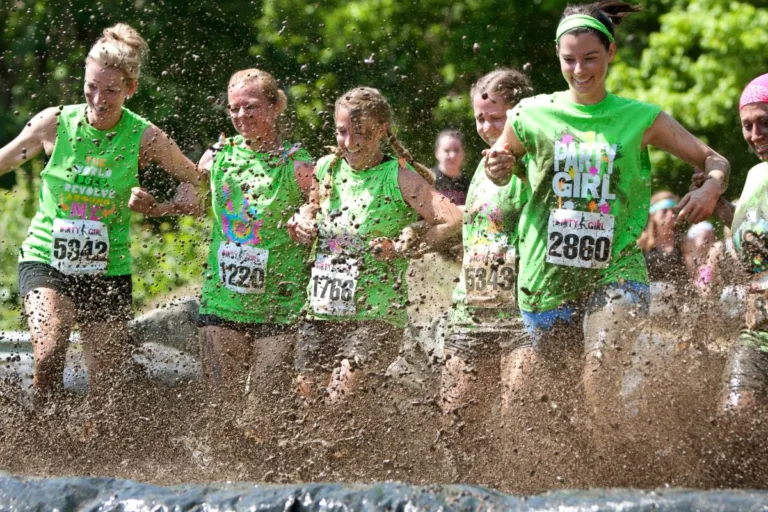
I’ve participated in a few different mud runs now, and I can remember exactly what my first one was like — what I did right (and didn’t do right), things I wish I would’ve done differently, and things I definitely want to change when I do future mud runs.
I’m here to give you a good idea of what to expect when planning, preparing, and training for your first mud run.
In preparation for your first mud run, you’ll want to consider the following:
Fitness Level and Training
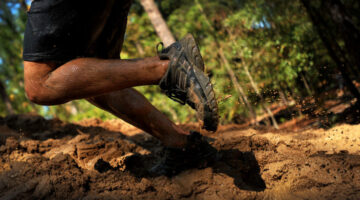
I’m not a runner. But I walk for exercise, and I like the idea of obstacle events. Ten of my female cousins and I signed up together for our first mud run – the Dirty Girl 5K Mud Run. Our fitness levels ranged from limited walking while recovering from back surgery to hardcore racing. How’d we do?… We were able to complete all the obstacles, with the exception of two that my cousin with back surgery opted to skip (and after watching the rest of us complete them, she thought she could probably have safely done them). Whether you plan to run or walk the event, train accordingly! If there are obstacles at your first mud run event, you will want to add some upper body strength training. Check the event website to see if they describe the obstacles — because that will help you know what types of things to expect and train for. A good rule of thumb is this: You should have a baseline level of fitness that will allow you to participate safely and not be an undue burden on those around you or block their path.
READ: 3 Exercises To Help You Train For A Mud Run
Clothes
Most mud run events will be held rain or shine, so plan ahead and dress for the weather. Remember the mud will be heavy, and it will weigh down your clothes. You won’t want to wear loose-fitting elastic pants (unless you can tie them and tighten them). There may be obstacles where you must use both hands, and you will NOT be able to pull up your pants if they start falling down. Ideally, you’ll want to wear moisture-wicking clothes to help repel the mud.
READ: What To Wear At Your First Mud Run Race
Shoes

Wear good supportive running/walking shoes that you’ve already broken in and trained in. There may be mud pits that will suck your shoes right off your feet, so make sure they are securely tied. Several people at my event wrapped duct tape around the laces and bottoms of their shoes for extra support. While you may want to wash your shoes after the event (especially if you plan to do more mud runs), your shoes will be completely mud-soaked when you’re done — so it’s best to ditch or donate them. Many event organizers collect all of the muddy shoes to clean and donate.
READ: Mud Run Shoes FAQ
Costumes
At my first mud run, at least 25% of the participants wore some kind of costume. Mud run costumes can range from matching t-shirts with the team’s name on them to full on character costumes. The theme for your costume can be in support of the sponsor or benefactor of your event (the Dirty Girl supports breast cancer research organizations in the local community), or it can be something fun that personally represents your team. My team’s name was Dirty Dolls, and we dolled up in minimal costumes (matching shirts and headbands, pearl necklaces, red lips and nail polish). It was fun to be in costume, and we saw fun outfits all day. Just be careful to choose costumes that can carry the weight of the mud — AND that won’t hinder your performance on the obstacles.
READ: Bring Fun To Your Run – Wear A Costume
Team vs. Alone
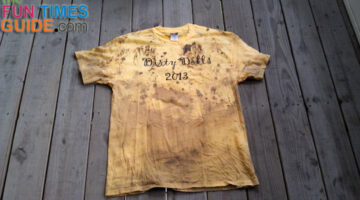
If you have friends or family members who want to do the mud run with you, by all means form a team! Usually the first person to register will record the team name, and the next people to register will be able to add themselves to the team. An event like a mud run with obstacles is definitely fun with a group of people that you know. But, if your friends are all sticks in the mud and you will be attending your first mud run alone… Go for it! The fun and camaraderie is definitely shared by everyone at the event — so you would only be by yourself by choice.
READ: How To Choose An Epic Name For Your Mud Run Team
What Are The Mud Run Obstacles Like?
While each mud run event is unique (based on location, terrain, difficulty level, duration, sponsor, and other variables), there are still many similarities among them all.
Review the event website to see if they describe the obstacles in detail. There might even be a video — so you can see participants in action tackling the obstacles.
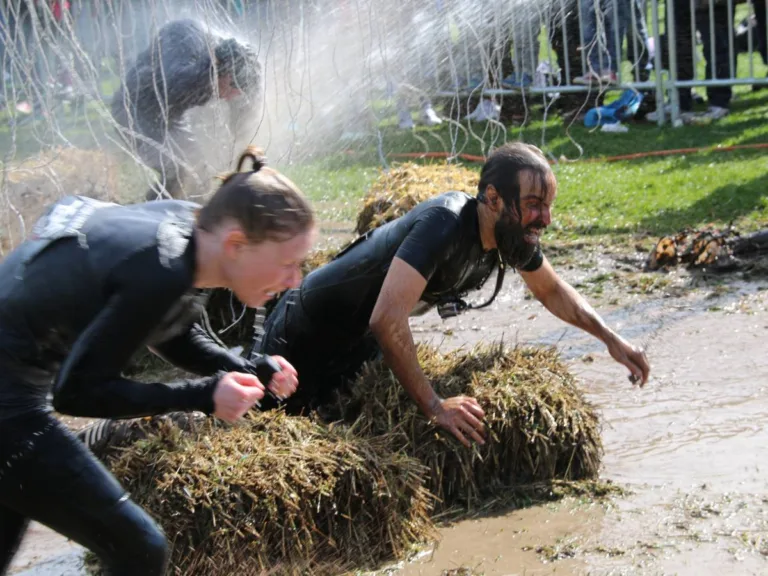
We had some interesting obstacles on the Dirty Girl mud run. And I’ve also reviewed plenty of other mud run events.
It’s safe to say that you will encounter some version of these obstacles:
Mud Pits
It’s exactly what it sounds like: a pit of mud that you slog through. There were several of these at my event – some of them man-made and about a foot deep. One was a lake that went as high as my waist (and even higher for shorter people). We also went in and out of a creek several times. Some of the other obstacles also had a pit of mud under them (…or waiting for us at the end of them). All of the mud at my event was muddy water at the top, dropping to squishy mud that covers (and sucks off) your shoes at the bottom. Other events have different kinds of mud that can be really, really thick and deep (think of a really stiff oatmeal), making it much more difficult to walk, run, or slog through it.
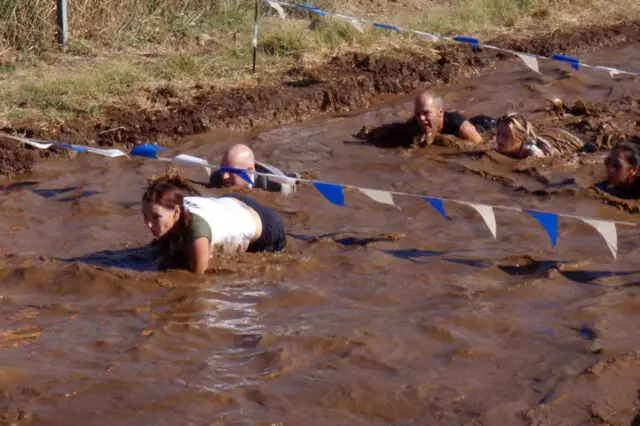
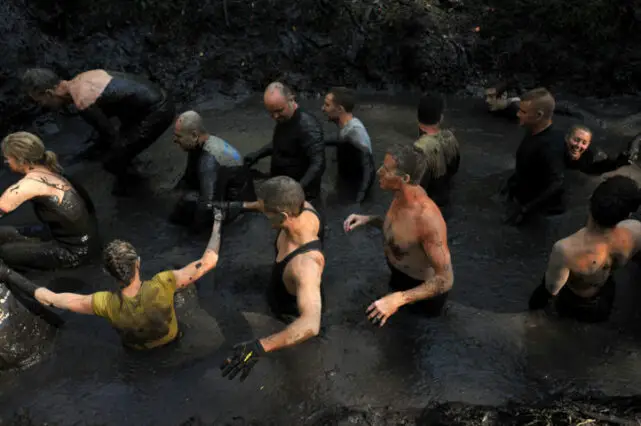
Army Crawls
You tackle these on your hands and knees (often down to your belly), and sometimes even your face will be in the mud. You will crawl under something or through something, or both. Many mud run events have you army crawl under barbed wire, some having you crawling under fire. At my event we crawled through a long tube. I was able to be on my hands and knees, and the dirt was a couple of inches deep. At other events the mud is thick like oatmeal — making this type of crawl even more difficult. My biggest challenge was that the dirt was full of little pebbles that felt like they were cutting into my knees and hands. (And I did have some cuts after the event.)
Climbing Up, Down, And Through Obstacles
At my event, it was an inflated plastic pyramid. At other mud run events, it may be hurdling a pile of hay bales, climbing over/through tires, or climbing over/under logs in water. Either way, count on it to be slippery!


Climbing Over Walls
When you’re climbing walls on the mud run obstacle course, they may have ropes to help you pull yourself up. They may have slim ledges you can climb on. Or, they may have neither. Again, slippery!
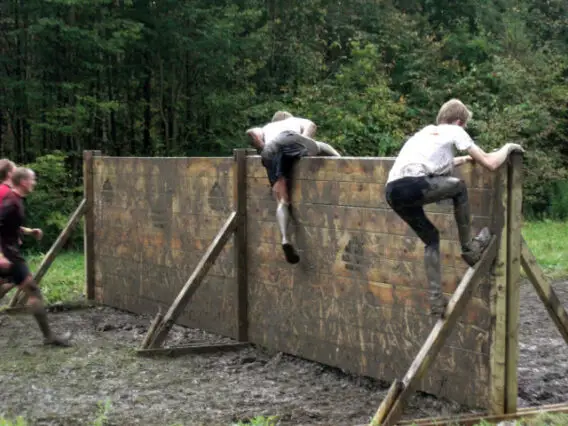
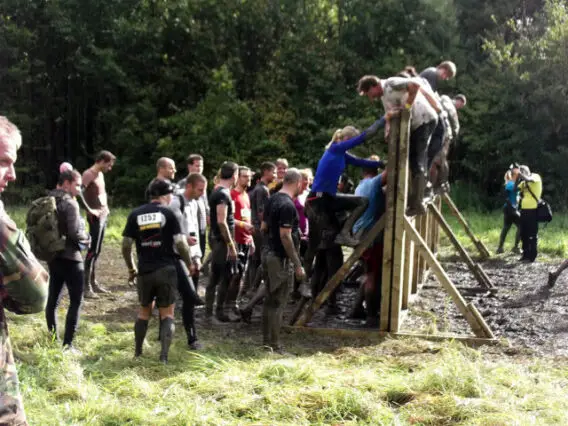
Sliding
Usually, you’ll be sliding down something that you just climbed up — and probably into mud. At some events (like the Dirty Girl Mud Run) it may be an inflatable slide that you had just climbed up. At other mud run events, you might be sliding into a muddy pit or sliding down a steep and muddy hill.

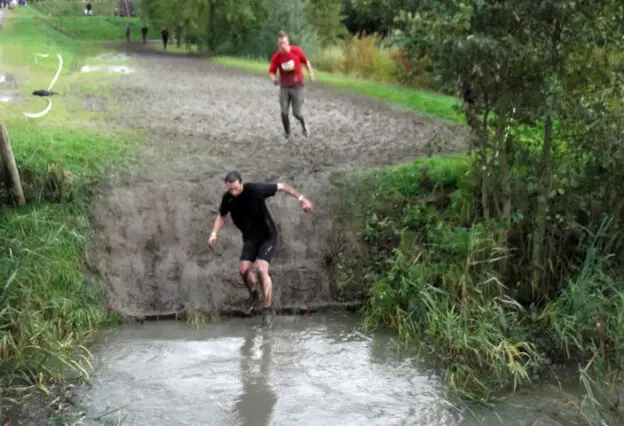
Jumping
Often you’ll be jumping over something, into something, down from something (probably mud-related and possibly fire-related). Yes, that’s correct, at some mud run events you will jump over fire.
Cargo Nets
My first mud run event had cargo nets two different ways: (1) Like a tent… climbing up one side to the peak and then down the other side and (2) Straight across horizontally… like a trampoline. (It was actually harder to go straight across horizontally.)
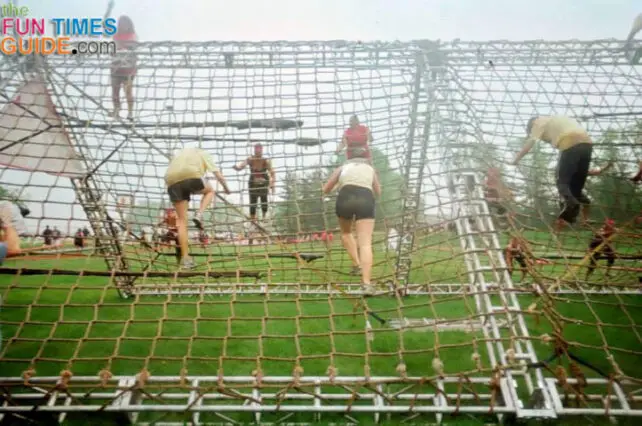
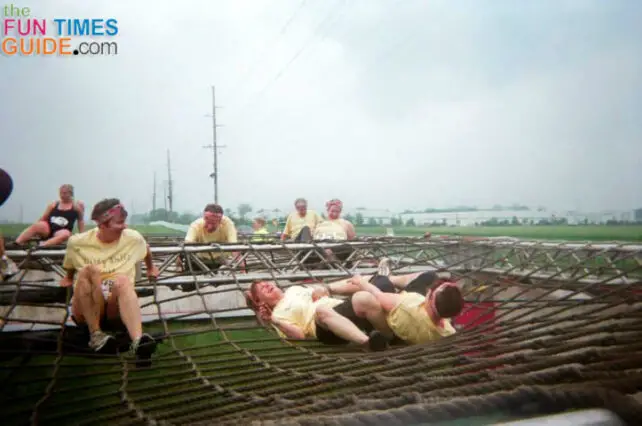
Rope Pulls
You’ll be using a rope that is secured at the top of something to pull yourself up. We had to do this several times from the creek bed up the side of the creek. As more people did this, the side became very slippery and difficult to climb. I don’t have great upper body strength and this became my biggest challenge. I was also really sore from it the next day!
Zip Lines
You will be connected to a harness or a seat of some sort, which will clip onto a secured line, allowing you to slide (or zip) down the line.
Slip and Slides
These may be down a sloped hill, or possibly straight across a field. The water makes them extra slippery.


Monkey Bars
These are usually just like the monkey bars on a playground. Some mud run events have other versions — like monkey bars at an angle, where you need upper body strength to get across.
Water Crossings
You may walk through water (such as a pond or a pool), crawl through water, jump into water, or traverse across water on a wobbly float. You may need to plunge underwater and hold your breath to get under a wall or some logs. You may slide into a pool of water and go under. Some mun run events have you jump from a dock or a ledge into deep water — where you will definitely go over your head. I found one mud run event (Met Con Blue – Full Metal Jacket) that says you “must have a commanding grasp of swimming.” If you are not a confident swimmer, talk to one of the obstacle facilitators for help with that particular obstacle, or just go around that obstacle.

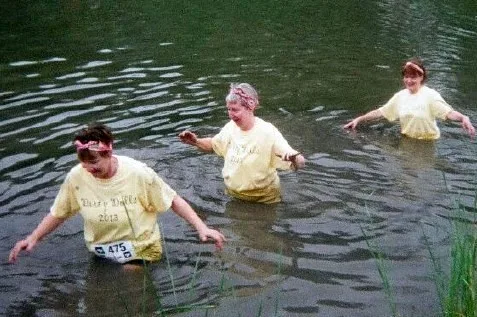
Natural Terrain Challenges
The unique location for each mud run event will allow for some all-natural elements as obstacles. For example, you might be climbing up and down steep woodland hills or traversing in, out, and through rough & rocky creeks. There’s a great video of different obstacles for the Big Dog Brag event to give you an idea of what some of these can look like.
Every race location sets up its obstacles at different intervals. Sometimes you’ll encounter obstacles that are spaced evenly apart, say every half to full mile away from the next. Sometimes you’ll encounter several obstacles in a row, or run over a mile without encountering any obstacle at all. Typically, how often you’ll encounter an obstacle depends on the local terrain where the race is held — often out in the country, in fields, and even encompassing park areas that have dirt trails.
~Spark People
What If You Try An Obstacle But Can’t Complete It?
If an obstacle is getting the best of you, the first thing to do is ask for help from your teammates or other participants.
Many obstacles cannot be completed by the individuals alone — such as the 12-foot wall with no rope or steps where participants must help each other over the wall. Sometimes a helping hand (or push!) will make all the difference.
It seemed like before me stood every negative thought in my head that was saying, “You can’t do this, back down now,” in wooden wall form. And it was right, I couldn’t. I even verbalized that to my teammates and started trying to walk away. I didn’t want any more of this. Nope, one of my long-time friends wasn’t letting me off that easy. He pushed me back to the wall. I gained footing on the ledge half-way up and then they elevated me to the top. I swung myself over and dropped down. I took to a knee and was breathing heavy. But damn that was cool. It felt amazing to have friends there willing to pick you up and get you over your own insecurities, doubts and fears. I had never felt that type of bonding in such a tangible, gritty way.
~Brett Milam
But what if you’re scared to try one of the obstacles?
One of the reasons many people participate in these types of events is to push themselves with new challenges, as well as to try and conquer old fears. So first, use the support of those around you and the positive energy of the atmosphere to give it a try. You might surprise yourself! You will never regret it if you try and still can’t do it, but you will regret not trying.
One of the most extreme mud run events, the Tough Mudder, actually encourages teamwork and states that camaraderie is just as important as the obstacles themselves:
We encourage mudders to work together to dominate whatever hurdles we throw their way. Whether it’s hoisting one another over a lubed-up quarter pipe or buddying up for laps in frigid water, Tough Mudder is all about being there for one another. But don’t worry, that warm and fuzzy feeling isn’t your inner stone-cold killer wimping out, it’s probably the next obstacle that we’ve set on fire.
If you truly are unable to complete an obstacle, just go around it. Some events do keep track of everyone’s time, and they often have prizes (or rewards) for those who complete the entire course — including all obstacles. So you may have to forfeit that opportunity if you skip an element, but you can certainly skip obstacles if you choose.
Other Things To Expect At Your First Mud Run
Most mud run events clearly state that it is not a race. The goal is for you to have fun, challenge yourself, and to safely finish the event.
You and your team will be able to set your own pace as you do the course, based also on how fast the people in front of you are going.
There are typically multiple starting times (waves) throughout the day — to help control the flow on the course. For example, at the Dirty Girl event, the first wave of the day is the only timed event, and all the diehard runners tend to sign up for that wave.
My team and I walked the entire course together. Those in our group who wanted to run for a little bit waited for the rest of us at the next obstacle.
There was a good mix of runners and walkers at the Dirty Girl mud run, although most of the course was set in a field — which was filled with rocks and holes — making it a safety concern for the runners.
Speaking of safety, medical personnel should be present on-site at any mud run event. If you have questions about that or have specific medical concerns, you should contact the event organizers prior to your event. Ideally, there will be volunteer staff present at each obstacle and at each water station, in the event that someone needs assistance.
At many mud run events, photographers are walking throughout the course taking pictures. These are available to view on the event organizer’s website after the event. (Search for your group members with the number assigned on your race bibs.)
TIP: My group also took disposable waterproof cameras. I was really glad we did this, as there were not very many pictures of my group on the official site. Keep in mind, you will have to strap the camera to you at times when you need to use both hands for an obstacle. We took turns with the camera, and I tied the strap around the shoulder of my t-shirt when necessary.
After celebrating at the finish line, grab your gear bag and find the showers. (Be sure to check the event’s website in advance to confirm the availability of a gear check station and showers!)
Some of the showers will be really primitive (like individual water hoses) while others may be better (like fireman hoses). The Dirty Girl mud run had a fantastic indoor tent facility with over 50 individual shower nozzles. However, I’m told the majority of mud run showers pale in comparison.
Finally, you’re ready to enjoy the food, drink, and entertainment area. It’s time to celebrate the completion of your first mud run!
Of course each event will be different, so review event materials to see what yours will be like. Many events offer “1 free drink/beer” with your entry fee. You will need money for other drinks and food.
Other possible attractions include games, massages, temporary tattoos, hair braiding, souvenirs, etc.
Find A Mud Run Near You
So are you ready to do a mud run? (I know I’m ready to do another one!)
The best way to find a mud run in your area is to start at the Mud Run Guide, where you’ll find a complete list of all mud run events. There you can search mud runs by state, as well as mud runs by theme (like for women only, zombie runs, etc).
These are some of the most unique mud runs I’ve seen:
- Arctic Dash and Blizzard Blast – mud runs that take place in the winter
- Cahoots Duo Challenge – has obstacles created for (and requires) teams of 2
- Men’s Health Urbanathlon – a 3-city mud run that you can do solo or in relay teams of 3
- XRated Run – for adults only! They call it ’50 Shades of Mud’
- Dirty Beach Mud Run – with beer stops and tequila shots along the way
- GORUCK – created to mimic U.S. Special Forces
- Color Run – “the happiest 5K on the planet” has two rules: Wear white at the starting line. Finish plastered in color.
Some mud run events have a permanent home and are run once a year (like Mudsanity). While others are traveling events that take place all over the country (like Warrior Dash).
After you become thoroughly addicted to mud runs (like me!), you may want to look into the 3 events that are invitation-only based on your completion of their primary events:
- World’s Toughest Mudder (a 24-hour event, reviewed here)
- Spartan Ultra Beast (a marathon, reviewed here)
- Spartan Death Race (a 48-hour event, reviewed here)
Here’s a fun read: Spartan Race vs. Tough Mudder. (Both of them claim to be “the toughest” mud run.)
Good To Know Before You Go…
#1 – Sign up early. It’s usually cheaper the earlier you sign up. The fee goes up closer to the event. The entry fee for your event will go towards the cost of the event, with the rest likely donated to a specified charity. Most mud runs do not have additional fundraising expectations, but check the event materials to make sure.
#2 – Schedule your start time early. Start as early in the day as you can. That way you will avoid lines at the obstacles and have access to the freshest course. Some obstacles become worn down and slippery (after so many people have trampled on them) that they become much more difficult. At my event, the lines for the obstacles grew increasingly longer as the very hot day went on — and I was grateful for my early start time.
#3 – Read all the guidelines and tips on the website for your mud run event. There should be specialized suggestions based on the event details — like parking (most events have free parking available), spectator fees (while spectators are welcome at all events, some do charge a fee), and age requirements (I’ve seen age limits from 14 to 21).
#4 – Things to take: a change of clothes and shoes (duh), baby wipes (to get mud out of your ears and other nooks and crannies), towels (for after you get hosed down or shower), a large plastic garbage bag (for your wet and muddy clothes), gloves/knee pads/elbow pads (in my group, we all agreed we would like to wear knee pads next time). I might even wear gloves the next time because several obstacles had me pulling or holding onto ropes, which were tough on my sensitive hands that weren’t used to handling ropes.
And that’s it! You are now ready to go play in the mud.
Have FUN.
READ NEXT: Honest mud run tips & tricks from experienced mud runners.
I’ve been crafting for many years. I started with cross-stitching, then moved on to wearable art, projects with painted wood, fabric crafts, and paper crafts — which has transformed primarily into card making. I also do some rubber stamping and scrapbooking, but mostly I enjoy creating handmade, one-of-a-kind cards.

